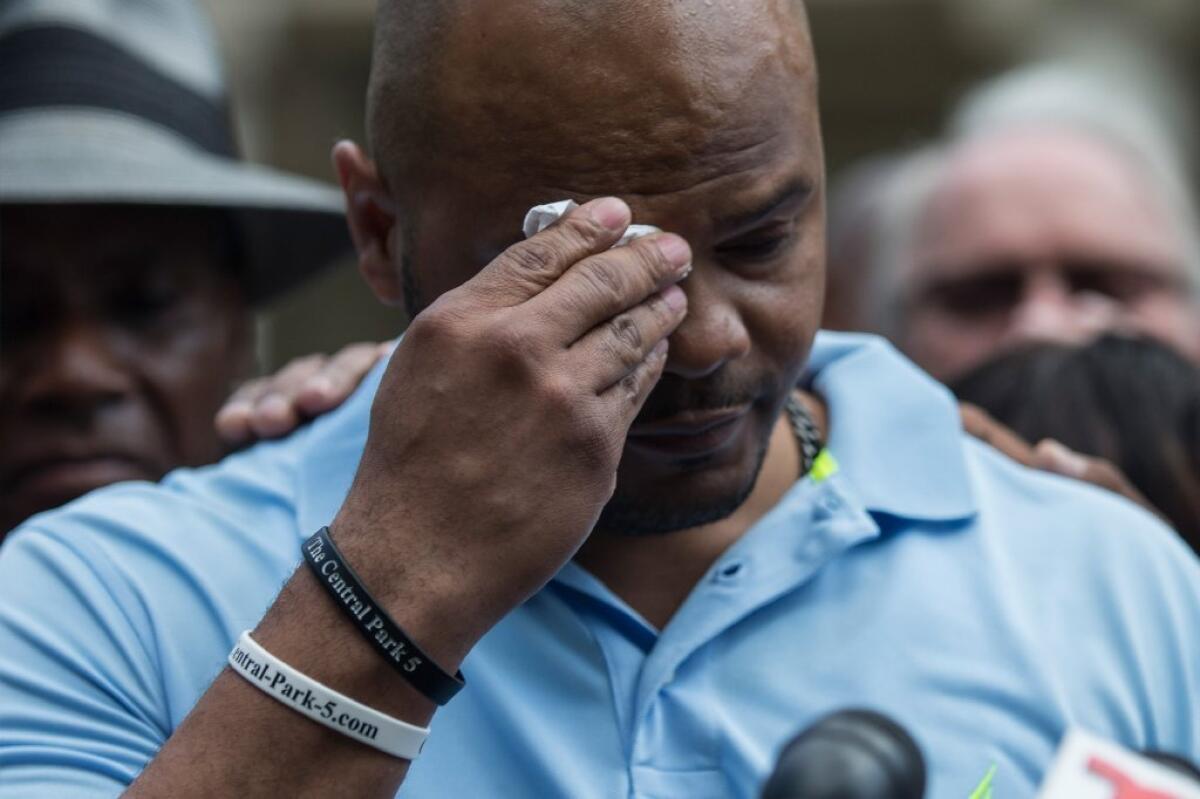Central Park Five: Money was not the issue in settlement with NYC

- Share via
Reporting from New York — Twenty-five years later, Kevin Richardson can’t talk about the Central Park Five case without breaking down in tears.
Raymond Santana can’t talk about it without his bitterness showing through.
Yusef Salaam can’t talk about it without shaking his head in disbelief.
It’s no wonder. The three are part of the Central Park Five, teenagers accused in the 1989 rape and beating of a young jogger and exonerated 13 years later after someone else confessed.
On Friday, Richardson, Santana and Salaam, along with relatives and attorneys, spoke publicly about the $40.75-million settlement with the city, a settlement their attorney says speaks volumes about the still-divisive case.
“It’s an amount that is significant enough that it represents an admission the city did something wrong,” said the lawyer, Jonathan Moore, who expects a judge to finalize the settlement within a week or two.
The city did not admit wrongdoing, which is the norm in such settlements, Moore noted.
But he added: “They should, if they ever want to cleanse their soul.”
News of a multimillion-dollar settlement broke last week, and it quickly resurrected the passions surrounding one of New York’s most sensational crimes, one that highlighted the city’s then-rampant crime problem and the public’s clamor for a police response.
The five were arrested the night of April 19, 1989, on the outskirts of Central Park, following complaints that a gang of youths was harassing and assaulting people in the park. Hours later, a jogger who had been raped and beaten nearly to death was found in the park.
The teenagers eventually implicated themselves in the attack but said they had been tricked into doing so by investigators who interrogated them for hours and coached them on what to write in their incriminating statements.
No physical evidence linked the five to the crime. Their statements contradicted each other and did not match details from the crime scene. But juries did not buy their claims of innocence, and all were convicted and sentenced to terms ranging from six to 13 years.
By the time the verdicts were vacated in 2002, after a convicted rapist and murderer named Matias Reyes confessed to the crime and DNA tests confirmed the confession, all but one of the five had completed their sentences. They filed suit against the city in 2003.
“You all don’t really understand what we went through,” Richardson, who was 14 at the time, said during a news conference outside City Hall. “People called us animals, a wolf pack,” he said, weeping as Santana patted him on the shoulder.
“It still hurts me emotionally,” said Richardson. “Now it feels good to have a voice, because we didn’t have one in 1989.”
Santana said that, despite the exoneration, the Central Park Five, who also include Antron McCray and Kharey Wise, still are eyed with suspicion by many people. No amount of money can bring back their lost youth, he said.
“We were considered the scum of the earth,” he said. Speaking of the settlement, Santana said the lawsuit was not about seeking money but about seeking justice -- something Salaam said he finally believes is happening.
“I don’t know if I truly believed this day would ever happen,” said Salaam. “It seems like justice has started to be restored.”
Not everyone agrees. One of those named in the lawsuit, former prosecutor Linda Fairstein, who headed the Manhattan district attorney’s sex crimes office during the Central Park jogger case, was asked about the settlement this week on NBC’s “Today.”
She said the city’s lawyer had “looked us all in the eye and said there’s absolutely no evidence of police or prosecutorial wrongdoing.”
“So why this money?” Fairstein asked. “Perhaps the mayor can explain. I can’t.”
Donald Trump, who famously bought an ad in the Daily News days after the Central Park attack calling for restoration of the state’s death penalty, called the settlement “a disgrace” in a statement published Saturday in the Daily News.
“Settling doesn’t mean innocence,” he said.
Santana called Trump’s statements a “pathetic” attempt to get attention.
“I kind of feel sorry for him,” Santana said.
Follow @TinaSusman for national and New York news
More to Read
Sign up for Essential California
The most important California stories and recommendations in your inbox every morning.
You may occasionally receive promotional content from the Los Angeles Times.











